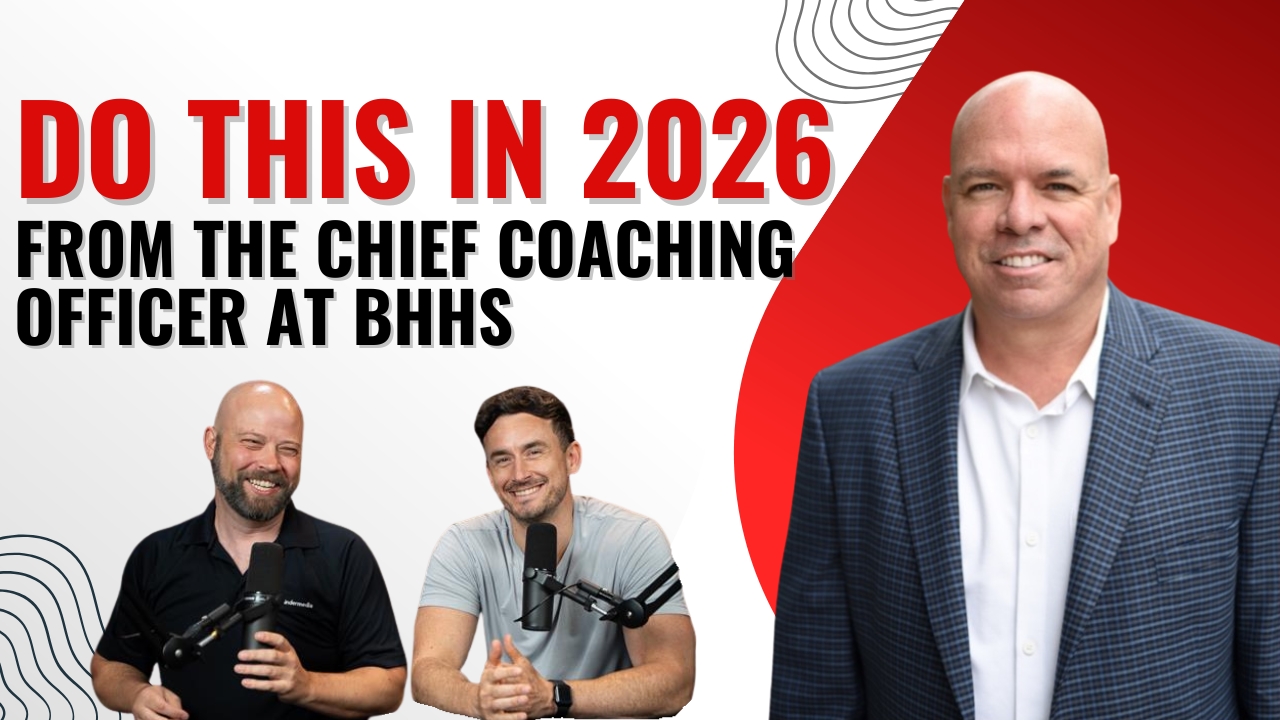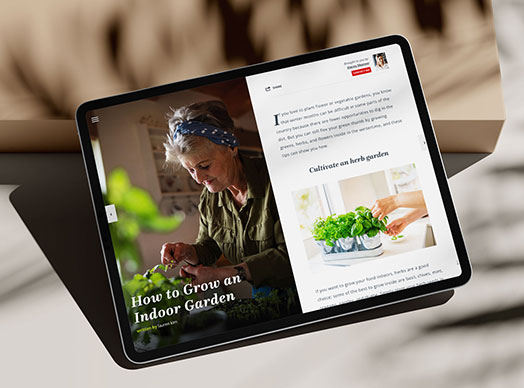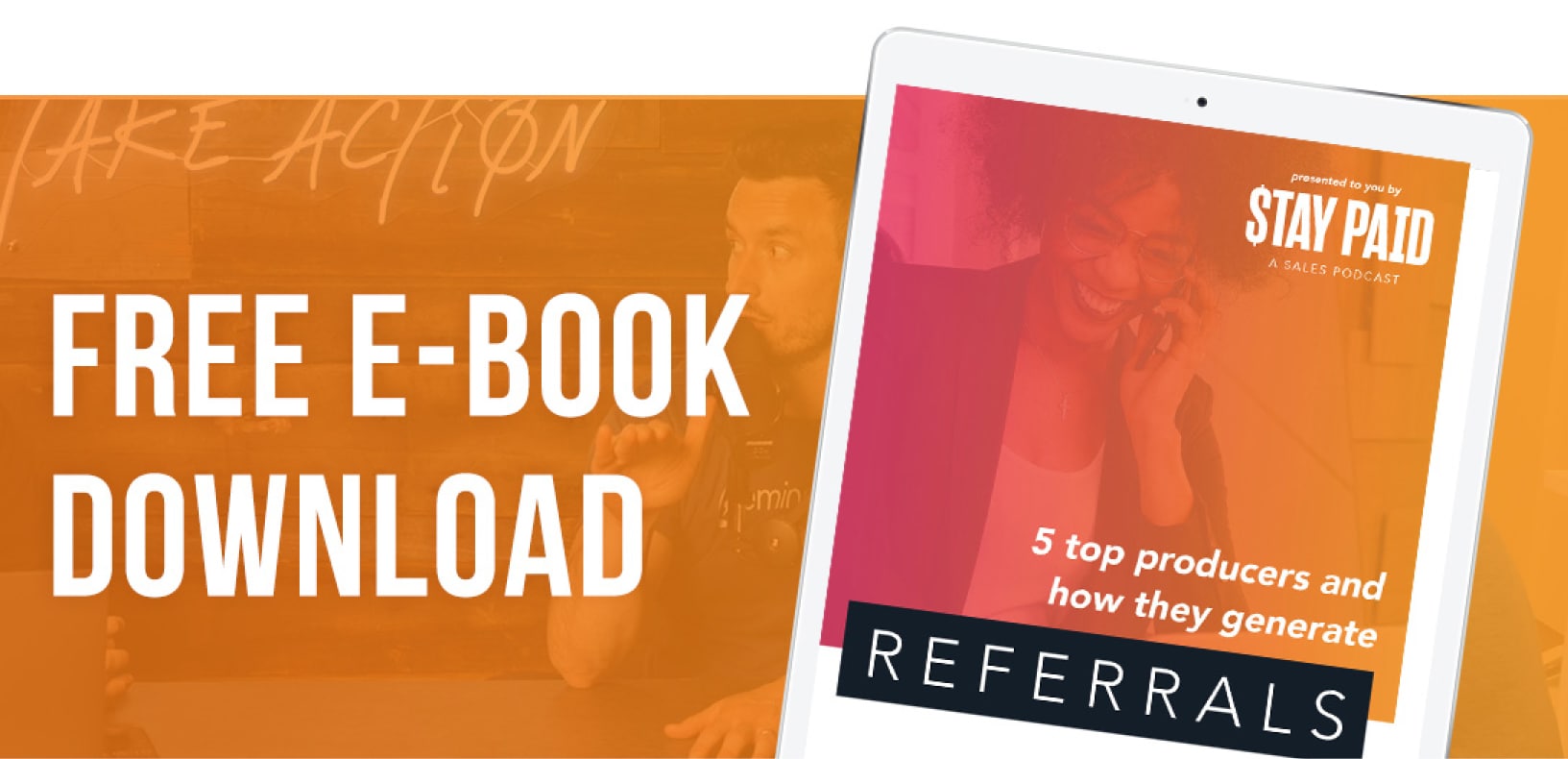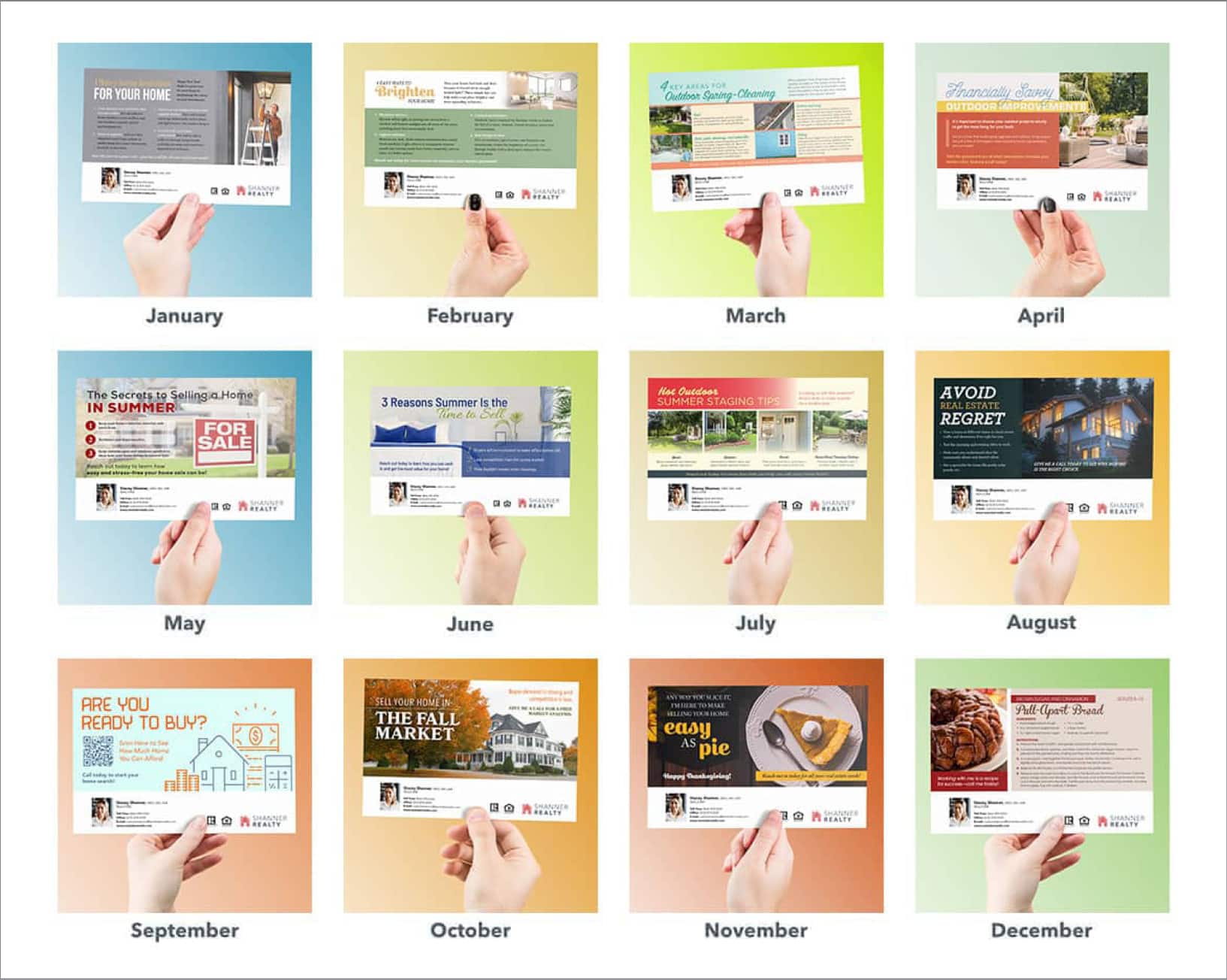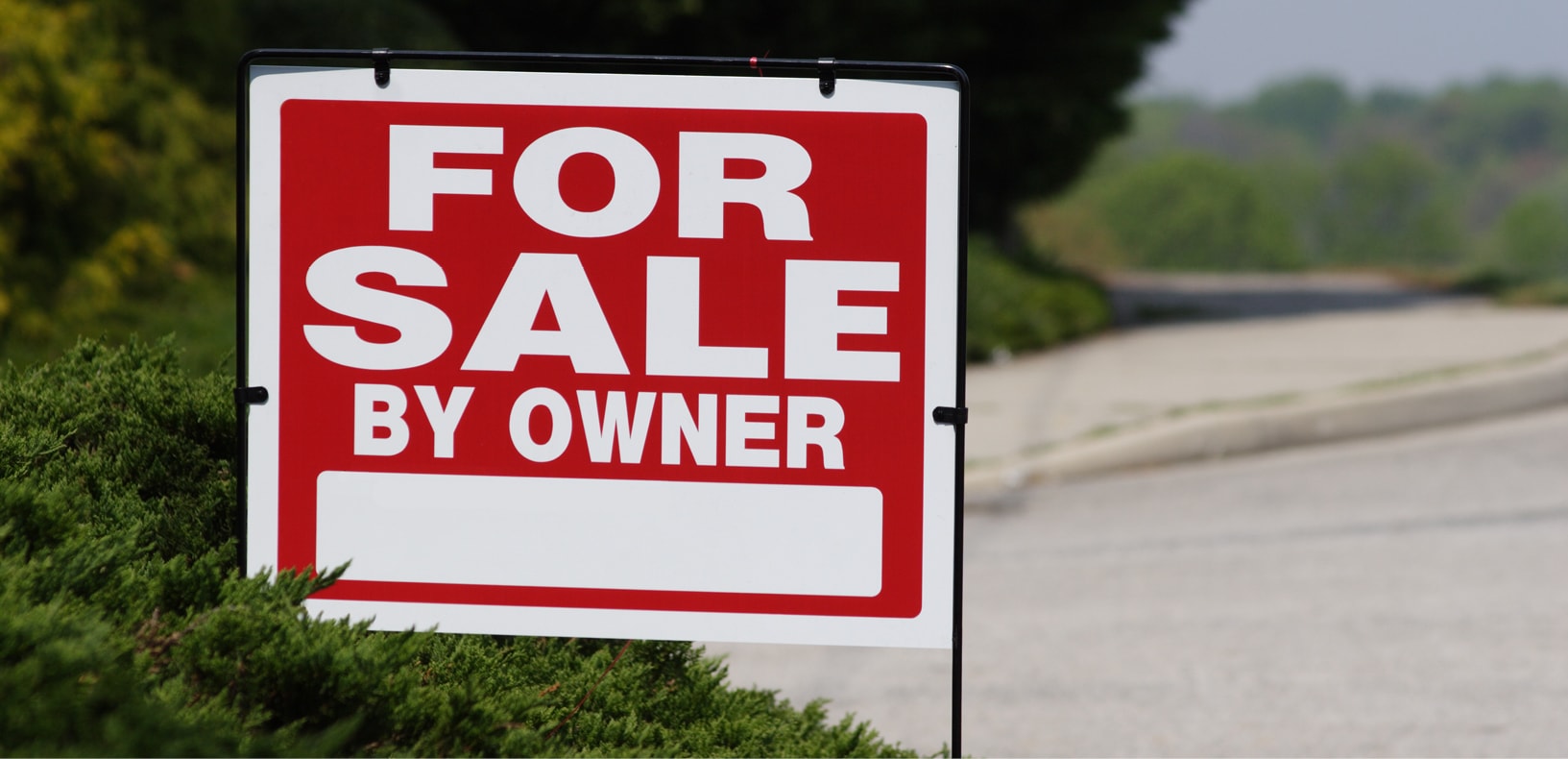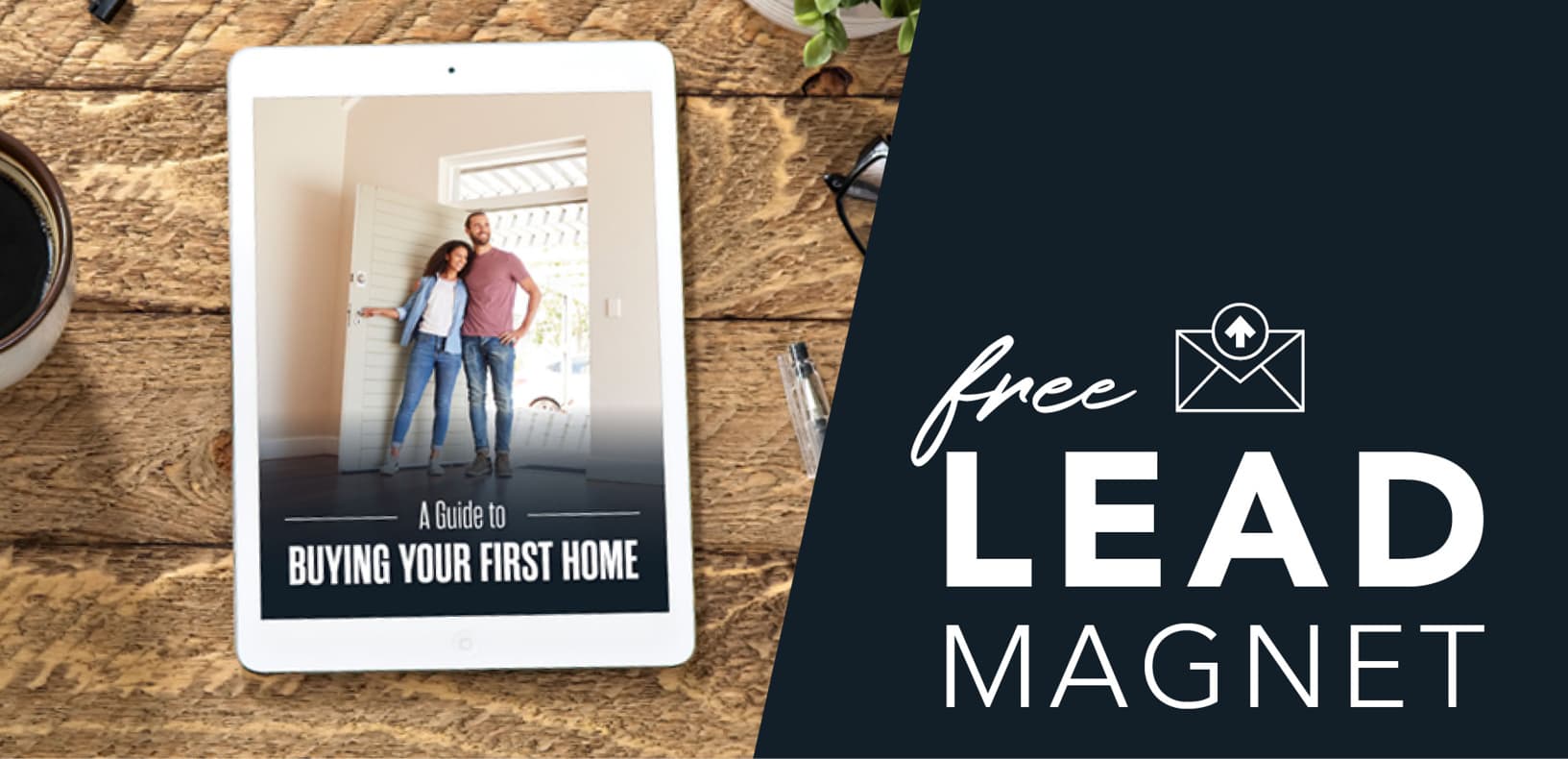Let’s say you’re a real estate agent who’s fairly new to the business, or you’re a broker who’s starting to build a team, and you’ve got to figure out how to manage marketing for a small business on a tight budget. Well, rest easy because you’ve come to the right place! I’ve got some inexpensive but effective marketing ideas you’ll want to consider.
Most of them are super easy, and, where applicable, I’ve included links to free resources that we’ve sent to thousands of clients that will help you quickly implement them.
I promise that if you put these ideas into practice, then you’ll soon be on the right path to branding your business and attracting the attention of leads without draining your bank account.
But before explaining my list of 15 low-cost marketing ideas, let’s take a minute to talk about your budget.
Marketing by the numbers
As a new or mostly independent real estate agent running a small business, you might think that (at least in the beginning) you can forego creating a marketing budget.
That would be a bad idea.
You need a marketing budget for a small business not only because you need to know how much money you have to spend and where you should spend it but also because you need to know things like:
- Are you financially on track?
- Have you set realistic expectations and goals?
- Are you putting more money into what’s working and diverting money from what isn’t?
- Do you and your team focus on the activities that are converting?
Marketing expenses are only one piece of your overall budget that should include items like operational expenses, licenses and continuing education, client gifts, brokerage fees if you join a broker, travel, and more.
If you’re a new agent starting out, an early stage startup marketing budget should include about 20-30% of your overall budget. You’ll need this money for branding (getting the word out) and looking for leads. As time goes on and you can start to work with referrals from your sphere, you might begin to scale back your marketing budget. Just don’t go below 10% of your gross commission income because you can start to spend yourself out of business. Remember that it takes money to make money, so you always need to be spending money on your marketing.
If you’re looking for help with creating your marketing budget, then I suggest you check out these free resources. Both are excellent sources of advice where the rubber hits the road:
- Solid Advice for Creating Your 2022 Marketing Plan is a 17-minute Stay Paid podcast episode that explains how to plan your budget and where to spend your money so that you hit your goals. The hosts, Luke and Josh, also offer some lead generation activities to get you where you want to be.
- Your 2022 Marketing Plan: A Step-by-Step Approach to Success is a free webinar that provides you with detailed instructions for doing the math needed to hit your revenue goals (there’s even a free spreadsheet you can download that does the math for you), explains which marketing strategies to use and how much to spend on each, describes different marketing platforms and what the research says about their ROI, and more.
With your real estate marketing budget in place, you can start to immediately and easily act on these 15 inexpensive marketing ideas. (Quick note: If you think that these ideas are common sense, you’re right. But despite their proven effectiveness when implemented with consistency, you’d be surprised by the number of agents who don’t use them.)
1. Send email to your sphere
If you aren’t regularly communicating with your sphere through email, then you’re missing out on the benefits of what is likely the last remaining free marketing channel. It costs just as much to send a single email as it does to send 2,000 emails (nothing, nada, zip, zero), which means your ROI is unlimited.
Your only challenge in sending emails is to ensure that what you send offers value to your sphere. The information should be something your recipients find entertaining, educational, or endearing.
Jimmy Burgess made $11.2M in 90 days (that’s no joke!) with a simple video email. The key to his massive success wasn’t simply in what he offered—a free home valuation—but in the precise phrase he used and how he delivered the information. You can hear precisely what he did, including the specific words he used, here.
A second email idea is to send a newsletter regularly. Everything you need to know about creating a newsletter—why you should have one, what you should include, who can provide you with templates, even tips for what to call it—is included in this comprehensive guide to real estate newsletters.

You select the area and we’ll hand-curate top-quality local and virtual events you can share with your sphere.
If you’d rather have someone else do the heavy lifting, we provide an automated, personally branded newsletter that goes out every two weeks to your selected list of recipients. It includes high-quality, hand-curated local and virtual events your sphere will appreciate.
2. Send video text messages
Not many people use video text messages, which makes it much easier for those who do to stand out and rise above the noise. It’s a simple thing to do, and you can do it anytime to connect with anyone who has a smartphone.
- Driving past a home you sold? Send a video text message to your client that says you were in the neighborhood and that you love what they’ve done with the garden.
- Found a restaurant that serves the best dinner-size salads? Send a video text message to your client who’s a vegetarian.
- Come across a great sale on dog food? Send a video text message to your client who has multiple dogs.
You get the idea.
But you don’t need to restrict yourself to single messages to single recipients. There are video text messaging services that enable you to record, send, and track messages delivered to large numbers of people. These services will provide analysis, reports, and other features, so compare their capabilities and costs before deciding which one will work best for you.
3. Create a YouTube video
Simply put, YouTube is huge, and it’s growing every day. It operates like a search engine for videos, so you need to think about your videos in the same way you would think about any text-based marketing you would want to be found in a Google search.
Generally, anything you would do to enhance the SEO of traditional content you should also do for video content—things like use a captivating title, have an eye-catching thumbnail, and include the right hashtags and key terms.
There is a ton of information available about using YouTube for real estate, and, not surprisingly, a lot of it can be found on YouTube. You might check out Karin Carr, who coaches agents about marketing with YouTube. There’s also TubeBuddy, a free browser extension that will assess your video and provide tips about increasing views and improving your SEO and ranking.
And don’t forget to include videos on your website. According to NAR, “Embedded video drives 157% more organic search results to [agents’] website[,] and real estate listings with videos get 403% more inquiries than those without.”
4. Record video testimonials from clients
It’s the power of social proof that enables video testimonials to drive leads to your business. Capture these endorsements of your service and post them to your website and your social media pages (don’t forget to tag your clients who will be sure to share). Think about picking a time when your clients are particularly excited about their experience with you, such as after their closing, to record. Their reaction will be fresh, their words authentic, and their feelings apparent—all of which make for great videos.
5. Get active on social media
According to NAR’s 2021 Technology Survey, social media is rated by agents as their third most valuable lead-generation tool. But you can’t just throw content onto social media and expect leads to start calling.
First, you need to know that different kinds of content are best suited to different platforms. The reason is simple—different platforms attract different audiences who prefer different types of content. Social media marketers generally agree that:
- Instagram is best for high-resolution images, short Reels, Stories, text graphics (like attractively designed quotes and inspirational sayings), and memes.
- Facebook works well for short videos, curated content, and interesting links to other content.
- YouTube is the top choice for longer videos (although at least one YouTube marketing expert claims 8-minute, short-form content hits the sweet spot.)
- LinkedIn acts as a reputable source for articles with a professional tone that examine topics in depth. Also appropriate for company news and announcements.
- Twitter is best for links to blog posts and news items.
- Pinterest is well-suited to infographics and GIFs.
There are more social media platforms than those listed here (Reddit and Quora come to mind) that you should consider using as well. Furthermore, you don’t need to create new content for each platform—just edit one piece so it is appropriate for the other channels and post.
6. Establish a Google Business Page
It is probably no surprise to read that Google is the top search engine in the world. However, it may surprise you to read that Google is now prioritizing local content, which makes having a Google Business Page an indispensable tool for agents.
Just imagine how often people search for “real estate agents near me.” If you want to be one of the top 3 featured businesses that appear in Google’s search results, then you need to listen to Jason Pantana’s Stay Paid interview. Jason is one of Tom Ferry’s most talented coaches, and during his interview, he explains in detail everything you need to do to optimize your Google Business Page, to become a Google Screened business, and to start immediately buying Google Local Services Ads.
7. Start creating content
You’ve undoubtedly heard of content marketing. It’s pretty much anything you create—social media posts, videos, blogs, etc.—that you share online to promote interest in your services and products. It’s a form of pull marketing where people actively seek out your services because you’ve demonstrated your authority and because they’ve grown to know, like, and trust you through your content.
You can download our free ebook, Become a Content Marketing Machine, and learn about the types of content agents should be producing and the 9 “pillars of value” that make your content attractive and effective. Combine what you read in this free resource with the information in another blog I’ve written, The Only 3 Real Estate Content Ideas You’ll Ever Need, and you’ll be better prepared (and certainly more informed than most of your competition) to start attracting leads with your content.
Still, if content isn’t your forte or you’d rather spend your time serving clients, but you still value the opportunities that content marketing produces, then let me recommend you take a look at our Branded Social Media Posts product.
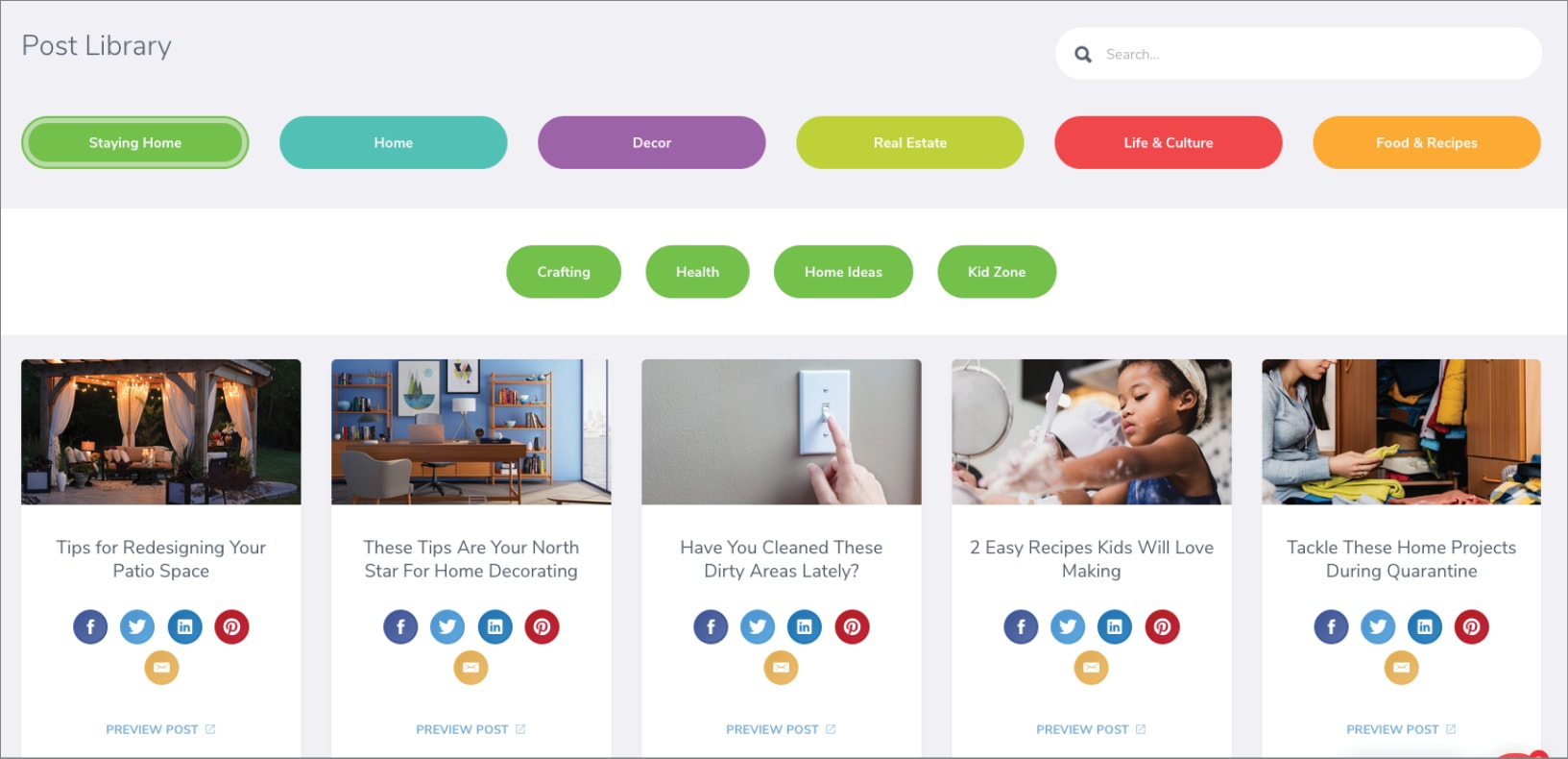
Our Branded Social Media Posts allows you to select from dozens of categories and thousands of blogs. We’ll even suggest blogs that are timely and topical.
We’ve got an extensive library of expertly written articles that we personally brand to you and that you can post to any of your social media sites any time you wish. Our Facebook scheduler gives you the ability to schedule posts weeks in advance so that you can literally set it and forget it. And the easy-to-use dashboard tells you what you’ve scheduled, what you’ve posted, and how your posts are performing.
8. Connect with local businesses
One of the most beneficial ways to market your business is to connect with other local businesses.
It makes sense to establish relationships with related services—home inspectors, contractors, mortgage and insurance brokers, lawyers, and the like—but also consider becoming the local mayor who knows the best barber, pet groomer, bakery, diner, house cleaners, landscapers, etc. in town.
Make a list of these businesses with their contact information and provide it as a helpful resource to your clients. Ask clients to mention you when they reach out to anyone on your list, and you’ll gain some reciprocal referrals in the process.
9. Engage in hyperlocal marketing
As I mentioned above, Google is giving priority in its search results to local businesses, which makes hyperlocal marketing an excellent strategy for building your business. The goal is to have someone searching for information about your neighborhood find your website.
Hyperlocal marketing is laser-focused to target people in a tightly limited local area. For example, an agent using hyperlocal marketing would promote themselves as the agent who is the expert, not in a 5-county area, but on specific neighborhoods within those counties.
A website designed with local SEO would include just about everything anyone would want to know about an area—the schools, transportation, dog parks, businesses, garbage pickup, entertainment, etc. It would include a calendar of events, images and videos of the area, and links to local government and other useful information. And, of course, homes for sale.
10. Purchase online ads
Google ads, Facebook ads, and ads purchased from other social media platforms are some of the most cost-effective ways to spend your advertising dollars. Called PPC or pay-per-click ads, you only pay a nominal fee when someone clicks your ad, and the more clicks you receive, the lower your cost.
If you’re new to PPC ads, want to know the best types of ads for agents, or simply want the 6 resources we’ve included for free, then spend some time watching our webinar, The 3 Facebook Ads That Every Agent Needs. You won’t want to miss out on the exceptional advice and step-by-step instructions for how to create your ad.
11. Follow up and ask for referrals
These are two of those commonsense activities that not enough agents do.
Following up can be difficult if you only consider it as another opportunity to pitch your business (it’s not), or you don’t know what to say. We coach our clients to consider following up as a way to stay top of mind and to nurture relationships. Think of your follow up calls as chances to touch base with friends.
When it comes to finding something to talk about, our personally branded magazines fill that need.

Click here to download a FREE PDF sample of any or our magazines.
Six times a year, we automatically send a publication to your exclusive list of recipients. Inside its 48 pages are engaging articles about a wide range of subjects that will vary depending on the title you select. Every issue includes your branding in six key locations, including two tear-out cards for sharing.
All you need to do is call your recipients the week your magazine arrives in their mailboxes. Ask if they received it, whether they liked it, and because you’ve checked your database notes before calling, you can strike up a conversation about one of the articles that you know would appeal to them.
If the conversation grows organically, then go with the flow. If not, simply let them know you appreciate their business and ask them to introduce you to anyone they know who may be moving in the next year or two.
Nothing could be easier. And because we mail it out for you on a regular schedule, you’ll never miss a touchpoint, and you’ll stay top of mind.
If you’d like to know how some of the most successful service professionals, including agents, garner referrals, then download How 5 Top Producers Generate Referrals. It’s another free ebook that we’re more than happy to share.
If you’d like a free, no obligation estimate for your own personally branded magazine, click here.
12. Network by joining community organizations
If you’re a new agent, you’ve probably been coached by your peers to join some local community organizations. Have you done it yet?
We all know that real estate is a contact sport, which means you need to make contact with as many people as possible. You just never know who knows who.
But networking is a skill that involves way more than passing out business cards.
Take some advice from our president (he’s a pro at this sort of thing), and always, always, lead with value. Reset your priorities when you meet new people. Instead of trying to get something from them, strive to ask questions and listen actively for a chance to give them something.
- Could you or someone you know use their product or service?
- Do you have information they can use?
- Can you connect them with someone where the relationship may be mutually beneficial?
When you lead with value, people are much more likely to engage with you, remember you, and feel the need to reciprocate.
13. Send postcards
Sending postcards is a geofarming technique that is relatively inexpensive, considering one transaction will likely pay for a year’s worth or more of mailings. But geofarming is a patient person’s game, and too many agents get into the game only to quit too soon. The odds that a postcard arrives at the precise time a recipient needs your services are long, so you need to commit to farming for at least a year before expecting to see any results.
We recommend that instead of focusing on postcards as primarily a lead-generation strategy, use them as a way to become synonymous with real estate in your area and . . . you guessed it . . . provide value. Postcards that include recipes, sports schedules, holiday themes, DIY projects, and similar items are useful pieces of marketing that leads will welcome into their home and keep on their refrigerator.
Set a time to speak with one of our postcard marketing experts and we’ll add 25 FREE POSTCARDS to your order.
This webinar talks about 3 types of farming, how to best select a farm, why farming works (there’s a study discussed on slide 9 around timestamp 25:30 that you don’t want to miss—it’s crazy good), and additional tips.
14. Target expired listings and FSBOs
If you had no marketing budget and no leads, but needed to close some transactions asap, what would you do? You’d call homeowners desperate to sell their homes! It would be like shooting the proverbial fish in a barrel.
All you need to do is check your MLS every morning for expired listings and make your calls. Be prepared to tell them why you’d be able to sell their home when another agent couldn’t. Be the first to call, and you will very likely get an appointment since 77% of home sellers only contacted one agent before making their choice.
And, believe it or not, there are still homeowners, even in this competitive market, that think selling their homes on their own is their best choice. Well, you know better . . .
Share this ebook with FSBO leads. You can edit it to include your photo and contact information. It provides your leads with valuable information, and, in many cases, after they read it, they’ll come to realize how difficult it can be to sell a house the right way, and they’ll call you! We’ve also got a blog, 6 Easy Ideas for Converting FSBOS Into Clients, that’s worth skimming.
15. Use lead magnets
A lead magnet is pretty much anything you give away in exchange for a lead’s contact information. You’ve probably seen other agents’ Facebook ads offering a free comparative market analysis (CMA). Interested leads click the ad and are brought to a landing page where they enter their information and click Send.
Lead magnets typically generate warm leads—anyone who wants a CMA is likely thinking about selling—so you’ll want to respond to these leads asap.
If you’ve never used a lead magnet but think it might be helpful, or you want to try a new one to see how it performs, then download any or all of our free lead magnets as often as you wish.
Commit to consistency
As is always the case, you need to remain consistent with whatever marketing plan you choose. Don’t expect to send 2 or 3 postcards, and expect your message to stick. Don’t expect to find a following if you write a blog every week for a month then stop. And don’t expect one Facebook ad to make you a household name. Marketing simply doesn’t work that way.
Decide what you can afford to do in terms of money, time, and other resources, and then stick with it. If it helps, remember this bit of wisdom from American author Robert Collier, “Success is the sum of small efforts, repeated day in and day out.”








